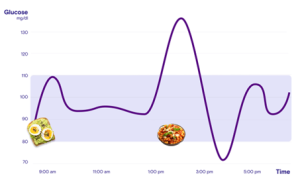BLOG Stable blood sugar: More energy and easier weight loss
Many people living with type 2 diabetes know the feeling: after lunch you suddenly feel sluggish and sleepy, or your concentration drops halfway through the afternoon. Very often, the reason lies in your blood sugar. The more stable your blood sugar, the more energy, health, and wellbeing you’ll experience in daily life.
High blood sugar drains your energy
When you eat foods rich in fast carbohydrates (like white bread or sugary drinks), yo
ur blood sugar rises quickly. With type 2 diabetes, your body’s insulin response is less effective, meaning glucose cannot easily move from your bloodstream into your cells. The result: your blood sugar stays elevated for longer.
Your body notices. While there’s plenty of glucose in your blood, your muscles and organs can’t access it properly. Your cells run short of fuel while the energy is “stuck” outside. The result: fatigue, trouble concentrating, and that familiar drowsy feeling after a meal.

Stable blood sugar = fitter days
When your blood sugar is steadier, you’ll notice the difference almost immediately:
-
More consistent energy – feel balanced throughout the day.
-
Less post-meal sluggishness – stay sharper for longer.
-
Fewer hunger spikes – less need to snack between meals.
It’s not just about medical outcomes like HbA1c. Stable blood sugar also means simply feeling better every day.
The medical background
In type 2 diabetes, the main issue is insulin resistance. Your body still produces insulin, but your cells don’t respond properly. This means glucose remains in the blood longer and drops more slowly than normal. Instead of a sharp “sugar crash,” you experience prolonged high blood sugar – which undermines your energy and, over time, can damage blood vessels and organs.
Stable blood sugar also supports weight loss
Fluctuating glucose levels don’t only make you tired – they also increase hunger. When your blood sugar rises quickly and then shifts downward, your brain often interprets it as a need for more food, even if you’ve just eaten. In type 2 diabetes this cycle is amplified by the disrupted insulin response.
Keeping your glucose steadier means fewer hunger spikes. That makes it easier to avoid unnecessary snacking and choose healthier meals. People often notice the difference within just a few days: stable blood sugar = less snacking and a stronger foundation for weight loss.
Weight loss brings extra health benefits
Losing weight has further advantages for people with type 2 diabetes. Less body fat often leads to reduced insulin resistance, helping your body respond more effectively to insulin. That makes it easier to keep blood sugar under control.
Some people even find that – always in consultation with their healthcare provider – they can reduce their diabetes medication as their weight and blood sugar improve. This doesn’t mean you should stop medication on your own, but it shows how lifestyle changes can have a real impact on your health.
How to discover your own patterns
Everyone reacts differently to food, activity, and sleep. One person may see a strong rise in glucose after pasta, while another barely notices a change. The only way to find out what’s true for you is through a Continuous Glucose Monitor (CGM). With real-time insights, you can see what happens after your breakfast, how a short walk affects your levels, or how stress and sleep play a role.
Small changes, big effects
The good news: small adjustments often make a big difference. A 15-minute walk after a meal, more fiber on your plate, or going to bed an hour earlier can already help stabilize your glucose. Stable blood sugar means more energy, fewer hunger spikes, easier weight loss – and sometimes, with your doctor’s guidance, even less medication.
By understanding your own glucose patterns, you gain the clarity to make choices that truly boost your energy, support weight loss, and improve your overall wellbeing.
